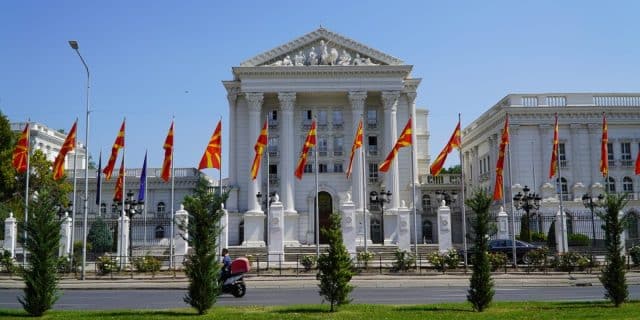Journalists were granted free access to the Central Registry under a 2017 decision by the then Social Democrat-led government.
Even then there were problems: journalists were not given a password for online access but had to submit a request and were then invited to the Central Registry itself to search for the relevant information on one of its computers.
Under new leadership since the conservative VMRO-DPMNE party took power in June, the Central Registry decided in October that the 2017 government decision does not supersede the law that limits free access to institutions on the state budget or local self-government units. Journalists would be charged.

Searching for info from the government may take weeks. Photo: Government of North Macedonia
North Macedonia’s Central Registry access stands out as particularly restrictive, compared, for example, to neighbouring Serbia and Bulgaria where such information is open to anyone with an internet connection.
“The central registry is essentially a database. It is not a private company that manages private data,” said Aleksandar Dimitrievski, a journalist with North Macedonia’s investigative TV magazine 360 Degrees.
“It’s simple – if someone needs an official document with a signature and stamp or sets of specific data, they will still pay for the service. But for everyone else, I don’t see why a portal can’t be created where non-official basic data will be free.”
The Central Registry said amendments were in the pipeline that would restore free access for media.
Dragan Sekulovski, executive director of the Association of Journalists of Macedonia, AJM, said the association expects the matter “to be settled as soon as possible and we hope that it will not be prolonged”.
Freedom o information requests stymied

The Central Registry said amendments were in the pipeline that would restore free access for media. Photo: BIRN
Besides the Central Registry, there are worries too over the effectiveness of Freedom of Information requests under the new authorities.
Since July 29, for example, BIRN has been seeking the names and salaries of advisers to North Macedonia’s prime minister, Hristijan Mickoski. Such information used to be public, published on the website of the government. Now it is not.
In late August, after failing to get answers directly from the government, BIRN filed an FOI request; days later, a response arrived saying the request had been approved but a 20-day deadline for the information to actually arrive expired.
BIRN repeated the FOI in September, this time specifically asking for the contracts of the appointed advisers, only to receive a response from Mickoski’s cabinet saying that the prime minister’s team of advisers was still being formed and the entire list would be published once it is complete.
The Centre for Civil Communications, an NGO that frequently uses FOI requests, said it too had run into resistance of late, with the most common excuse being that the information it seeks is classified.
“The problem is that no one has control over what information an institution can declare classified and for what reason,” said German Filkov, head of the Centre. “So it turns out that as soon as it receives a request for access, it can immediately classify it and thereby hide it from the public.”
‘Going backwards’

Infographic: BIRN
North Macedonia has made some progress when it comes to free access to open databases online, according to the recent BIRN report Open Data and Digitalisation in the Western Balkans: The State of Play.
For example, datasets on all budget transactions paid for by the Treasury are available and updated twice a month and can be downloaded in an open format. The government portal on public procurements also offers data on awarded contracts in an open format.
The report found, however, that only 74 of more than 1,300 public institutions in the country provide data sets online, and not all of these can be found in the country’s central open data portal, data.gov.mk.
The government’s own website offers data on government sessions and decisions, finances, regulations and service data, but the data is not always published on time or regularly updated.
The law on free access to public information, in force since 2006, requires every public institution to have a designated employee responsible for handling requests for information of a public nature.
According to Filkov, the public servants given this task did not change over the past year; what did change were the heads of the institutions.
“I can conclude that it is precisely the people in charge who are behind every negative change in the practice of disclosing information,” he said.
Such changes, he said, “only serve to remind us that the fight for free access to public information is, unfortunately, daily, long and arduous, and instead of moving forward in publishing the unpublished, we go backwards”.
https://balkaninsight.com/2024/10/25/north-macedonias-new-govt-accused-of-backsliding-on-access-to-information/




